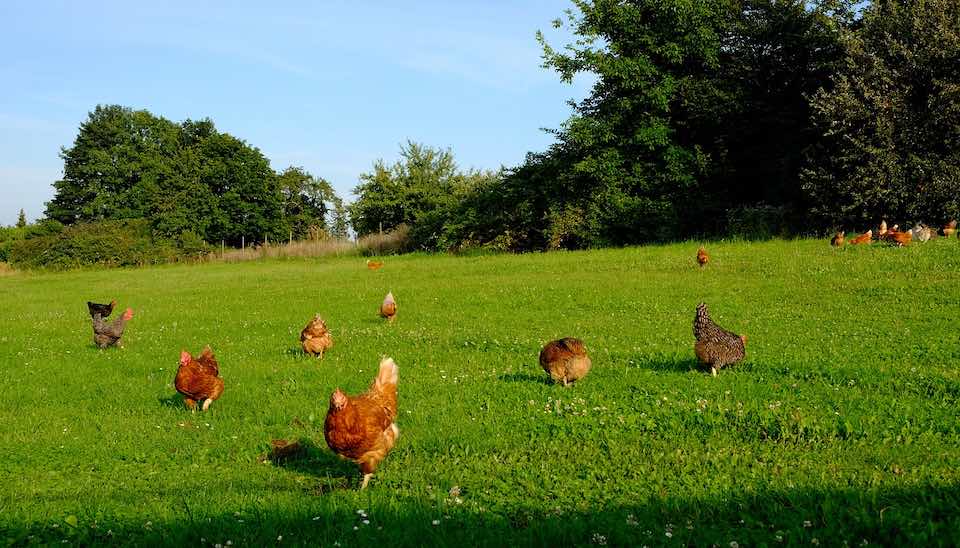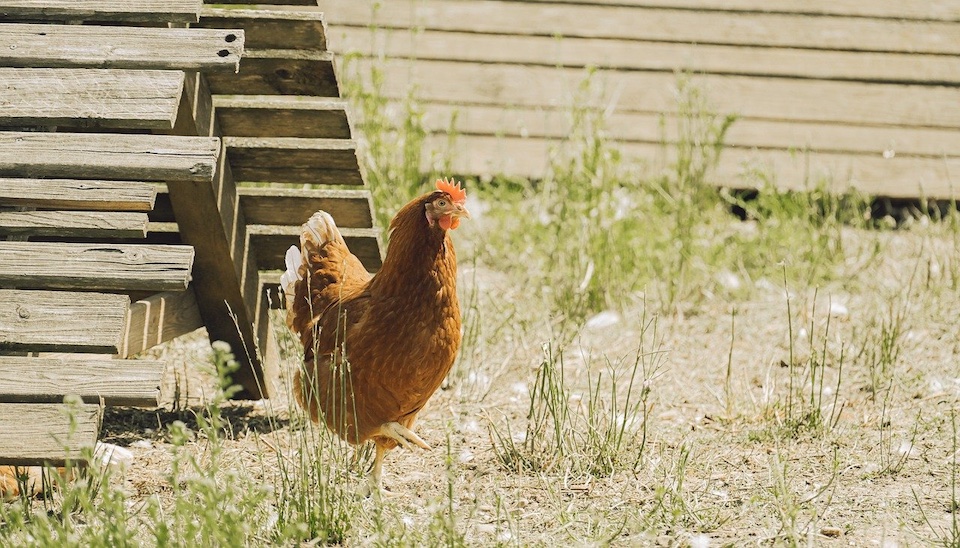Free-Range Chicken Keeping: Benefits, Risks, and Expert Tips for a Healthy Flock
Free-Range Chicken Keeping: What You Need to Know
If you're an experienced backyard chicken keeper, you're likely familiar with different methods of keeping your flock.
Many chicken keepers plan to have free-range chickens, but most of us end up with something of a compromise. Perhaps you’ve found that the dream of keeping free-range chickens isn’t so straightforward in reality? Despite the numerous benefits, successful free-range chicken keeping often requires careful management.
In this article, we consider the benefits and risks of free-range chicken keeping, as well as how to manage a free-range flock for the best results, as well as what other options give your chickens the same benefits as free-ranging.
Key Takeaways
- Free-ranging provides natural foraging benefits but requires careful management.
- Predators, plant damage, and wandering chickens are common challenges.
- Training chickens to return to the coop and protecting your garden are essential steps.
- Supervised or limited free-ranging offers a safer alternative for many backyard keepers.
- Rotational grazing can give chickens better access to fresh forage while reducing risks.
- Large chicken runs provide many benefits of free-ranging with added safety.
Free-ranging: Not as Easy as It Seems
Supermarket shoppers tend to think that free-range eggs are best, and backyard chicken keepers usually plan to keep a free-range flock.
In simple terms, a free-range chicken keeper allows their flock to roam freely. Rather than being confined to a coop or run, chickens go where they like and forage for insects, seeds, and greens.
In reality, it is rare that free-range chickens are not somewhat confined. Commercial free-range layers are confined to a certain area of “range”, while backyard chickens are usually restricted by property boundaries.
Free-ranging is favoured because it seems so easy. All you have to do is provide your chickens with a safe, secure coop overnight and let them out every morning. But in reality, only rarely are chicken keepers lucky enough to be able to just let their chooks roam free!
Pros and Cons of Free-Range Chicken Keeping
There are a lot of benefits to free-range chicken keeping, but it comes with risks too!
Pros:
- Natural Diet: Chickens get access to fresh greens, bugs, and seeds, which can supplement their feed and improve nutrition. Being able to roam as they please provides better access to quality forage.
- Healthier Chickens: The physical activity involved in foraging can reduce obesity and stress, leading to a healthier, more robust flock.
- Happier Chickens: Free-ranging allows chickens to express natural behaviours such as foraging and dust-bathing. In addition, a free-range flock has fewer bullying issues because chickens have plenty of space to spread out and avoid one another, along with mental stimulation from foraging.
- Pest Control: Chickens will naturally eat garden pests such as snails, slugs, and even ticks, which can be an organic way to manage unwanted critters.
- Fewer Parasites: Being able to dust-bathe naturally helps prevent parasites like lice and mites from pestering your chickens. Parasites thrive when chickens are cooped up together in a small, protected space like a coop, so free-ranging can help keep parasite numbers low.
- Smaller Coop: While you should still ensure your chickens have plenty of room in the coop, if they are only in the coop to roost and lay eggs, the coop doesn't have to be near as big as it would be if your flock was locked inside more often!
- Less Work: If your flock free-ranges, there is far less coop cleaning. You also have to provide fewer amusements for your chickens and no forage, because your chickens will be amusing themselves by foraging! All of this means less work for you!
Cons:
- Predators: Free-ranging opens up your chickens to predators like foxes, wild dogs, snakes, goannas and birds of prey, especially in more rural or bush-adjacent areas of Australia. Domestic pets can also pose a threat to chickens, and we have met hundreds of chicken keepers who have lost birds to neighbourhood dogs.
- Damage to Plants: If left unchecked, chickens can wreak havoc on a well-tended veggie patch or flower bed. In addition, when they are allowed to free-range, chickens will return to some areas more often than others, eventually killing the groundcover and even damaging shrubs and trees.
- Escape Risk: Depending on the size of your block, your flock may wander beyond your property unless you have chicken-proof boundary fences. Although most chickens will stay within 30-50 metres of the coop, some birds are more adventurous than others and can roam up to a kilometre. Chickens have an excellent sense of direction and rarely get lost, but they may fail to return to the coop if they have chosen to roost somewhere else.
- Danger to Your Chickens and Others: The further your chickens roam from the coop, the greater the risk of disaster. Chickens that wander onto roads may be hit by cars or even cause an accident.
- Annoying the Neighbours: Free-ranging chickens may wander into neighbouring properties, causing frustration for neighbours if the chickens scratch up gardens or leave droppings on the porch. Neighbours that keep chickens themselves may also be worried about the biosecurity risks of mixing flocks.
- Risk of Disease: Free-range chickens have increased exposure to wild birds, rodents, and other animals, which can raise the risk of parasites and diseases like Avian Influenza.
- Egg Hunts: Free-range chickens might not always return to their nesting boxes to lay, meaning you could be searching for hidden eggs and broody hens.
So Can You Free-Range?
Ultimately, very few chicken keepers can actually have a completely free-range flock. Except on very large blocks, a property boundary fence is needed at the very least! It is also rare that there are so few predators that chickens are safe without protection.
Tips for Successful Free-Ranging
If you’re ready to take the plunge into free-ranging, a bit of planning goes a long way to reducing the risks and maximizing the benefits.
Know Your Neighbourhood
For successful free-ranging, it pays to know your neighbourhood. This means you should be aware of what type of predators live in your area and how to best protect your chickens. Don’t assume that predators like foxes and snakes only pose a risk at night, or that predators won’t attack your chickens while you are at home!
If you are planning a free-range flock, it also helps to know your neighbours. Who has dogs? Are there any dogs that roam? It is also good to let your nearby neighbours know that you are planning to let your chickens free-range and make sure they know how to contact you if the chooks are causing problems on their property.
Train Chickens to Return to the Coop
Establish a routine where your chickens know to return to their coop each evening. A routine treat of Dried Mealworms in the coop at dusk is an easy way to encourage this. Make sure your coop is secure and locked up at night to protect against nocturnal predators.
Guard Your Garden
If you’ve got a productive veggie patch, it’s essential to chicken-proof it. The same goes for mulch around trees and any sensitive plants. Depending on the breed, simple barriers like mesh might be enough, but chickens can cause an awful lot of damage to plants and gardens in very little time! Bird netting can do double-duty protecting gardens from native wildlife as well as chooks!
Protect Your Chickens
Even free-range chickens need protection from predators. For aerial predators like hawks, trees and shrubs where your chickens can hide and forage under cover are important. If you have predators that hunt in the daytime, like foxes, large goannas (lace monitors) or predatory dogs, you will need predator-proof boundary fences.
Guardian animals are another option for protecting free-range flocks. Dogs are the most effective as they will chase off predators. While donkeys, llamas, geese and even roosters are useful for sounding an alarm if a predator appears, they won’t chase predators or intervene if a chicken is attacked.
What To Do If You Can’t Free-Range
True free-ranging is only really possible on large acreage. In addition, the many predators and other risks mean that backyard chicken keepers often feel it is too unsafe to let their flock free-range.
Fortunately, there are other options which give your chickens the benefits of free-ranging while keeping them safe and out of trouble!
Chicken Runs
Larger predator-proof chicken runs provide most of the same benefits as free-ranging, with the added bonus of knowing your chooks will be safe from harm. The bigger the run, the better! Plants as well as regular amusement can help keep your chickens busy even in smaller runs. Be mindful, even in the biggest runs, chickens will often kill the groundcover in their favourite spots.
Supervised Free-Ranging
If predators or damage to gardens is stopping you from allowing your chickens to free-range, another option is to allow your chickens to free-range only when you are available to watch them. Some predators will still snatch a chicken from right under your nose, so you do need to decide how much risk you are willing to take. Supervised free-ranging works best with relatively small, tame flocks that like to stick with you when you are outdoors. Regular Mealworm treats can help!
Limited Free-Ranging
If predators are not an issue, but roaming is, limited free-ranging is a good option. Basically, chickens are only allowed to free-range for a certain amount of time, which will limit how far they stray from the coop. While trained chickens can be recalled to the coop at any time of day with treats like Dried Mealworms, the easiest way to limit free-ranging is to let your chickens out in the afternoon, knowing that they will return to the coop to roost.
Rotational Grazing
Rotational grazing can actually be a better option than free-ranging, although it is more work. Rotational grazing involves containing your chickens and moving them from one area to the next on a rotation. This prevents your birds from straying too far, while allowing the plants in each area to recover after chickens have been there. Chickens in rotational grazing systems actually have better access to forage and insects than those that free-range in one area, however large. However, moving your chickens every day or so is a lot of work. Multiple chicken runs, chicken tractors and moveable fences are all options for rotational grazing. Commercial pastured poultry operations often swear by easy-to-move electric poultry netting, but we haven’t had much success with it at home.
Final Thoughts
Free-ranging can be a rewarding method of keeping chickens, allowing your flock to express natural behaviours while providing health benefits and garden pest control. However, like any method, it requires thoughtful management as predators and wandering chickens can pose challenges. With a few precautions and some clever planning, you can minimise risks and ensure that your chickens are getting the benefits of free-ranging, even if they need to be contained for their own safety.
Happy chicken keeping!
Rachael at Dine a Chook Australia



